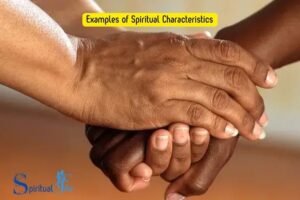Examples of Spiritual Blind Spots: Personal Biases!
Spiritual blind spots are areas of your life where you may lack awareness or understanding due to personal biases or unwillingness to accept certain truths.
Some examples of spiritual blind spots include pride, selfishness, resentment, lack of forgiveness, and intolerance.
Spiritual blind spots, much like physical blind spots, are areas in our spiritual lives that we cannot see or choose to ignore.
They can manifest in many ways, but typically involve behaviors or attitudes that are not in alignment with spiritual principles or values.
These can range from negative attitudes such as pride and selfishness to harmful behaviors such as resentment and intolerance.

Key Takeaway
10 Spiritual Blind Spots Examples
| Spiritual Blind Spot | Description |
|---|---|
| Neglecting self-care | Ignoring physical, emotional, and mental health, thinking that only spiritual practices matter. |
| Judging others’ spirituality | Believing one’s path or interpretation of the spiritual journey is the only correct or superior one. |
| Ignoring the present moment | Always focusing on the future or past, neglecting the importance of the present moment. |
| Material attachment | Focusing excessively on material possessions and wealth. |
| Lack of empathy | Failing to acknowledge and understand the feelings and experiences of others. |
| Spiritual bypassing | Using spiritual practices to avoid dealing with emotional and psychological wounds. |
| Intellectualizing spirituality | Relying solely on intellectual understanding and neglecting experiential or intuitive understanding. |
| Ignoring boundaries | Disregarding personal or others’ boundaries under the guise of spirituality. |
| Fear-based beliefs | Holding onto beliefs out of fear, such as fear of punishment or fear of not being good enough. |
| Spiritual elitism | Believing oneself to be more spiritually advanced, special, or superior to others. |
The Impact of Spiritual Blind Spots
Within the complex fabric of our lives, there’s an often unnoticed element – spiritual blind spots. These are hidden areas within us where our grasp of our spirituality is obscured, exerting profound influences on our relationships, decision-making, and overall well-being.
In this exploration, we’ll uncover the consequences of these concealed aspects of our spiritual selves.
1. Relationships
Picture two people embarking on a romantic journey, deeply in love, bonded by shared interests and dreams. Yet, beneath the surface, spiritual blind spots may exist.
One partner may hold unrecognized rigid beliefs about gender roles, while the other may carry unresolved spiritual wounds from the past.
These concealed spiritual aspects can lead to misunderstandings, conflicts, and emotional distance, even in the most affectionate relationships.
Moreover, spiritual blind spots extend beyond romance, affecting friendships, workplaces, and family ties. Unexamined beliefs and values can create divisions and obstruct effective communication.
Individuals unknowingly harboring biases or prejudices rooted in their spiritual blind spots may unintentionally harm others, eroding trust and harmony.
2. Decision-Making
Spiritual blind spots can shadow our decision-making. When unaware of our core values and beliefs, we may make choices incongruent with our true selves.
For instance, valuing environmental sustainability but fixating on materialism can lead to decisions harming the planet, fostering inner conflict.
These blind spots also expose us to external influences like manipulative leaders or ideologies. Without a clear spiritual compass, persuasive rhetoric or peer pressure can lead us away from our authentic selves.
3. Overall Well-being
The impact of spiritual blind spots on well-being is profound. Ignoring them can lead to emptiness, confusion, and disconnection, resulting in stress, anxiety, or even depression.
Conversely, addressing these blind spots fosters personal growth, self-discovery, and inner peace. Embracing our authentic spirituality brings purpose and fulfillment, positively affecting mental, emotional, and physical well-being.
In conclusion, spiritual blind spots touch every aspect of our lives, from relationships to decision-making and overall well-being. To lead a more fulfilling life, we must embark on a journey of self-discovery, illuminating these blind spots and embracing our authentic selves.
Recognizing Your Own Spiritual Blind Spots
Spirituality is a deeply personal and transformative journey, but it comes with challenges. One major obstacle is spiritual blind spots—unrecognized or ignored areas in our beliefs and practices.
Identifying and addressing these blind spots is vital for authentic growth and a deeper spiritual connection. This guide offers strategies to help you uncover and overcome them.
Self-Reflection
The first step in recognizing your spiritual blind spots is self-reflection. Take some time to sit in quiet contemplation and examine your beliefs, values, and practices.
Ask yourself the following questions:
- What do I believe about the nature of the divine or the universe?
- Are there any beliefs or practices I’ve never questioned?
- Do I hold any judgments or prejudices related to spirituality or religion?
- How do I perceive others’ spiritual beliefs or practices?
- Am I open to new perspectives and experiences?
Honest self-reflection can reveal areas where your spiritual understanding may be limited or biased.
Seek Feedback
Sometimes, it’s challenging to see our own blind spots because they are, by definition, areas we are unaware of. Seeking feedback from trusted friends, mentors, or spiritual guides can provide valuable insights.
Ask them for their honest opinions about your spiritual beliefs and practices, and be open to constructive criticism. They may notice patterns or inconsistencies that you’ve missed.
Study Different Spiritual Traditions
Exploring different spiritual traditions and belief systems can help you broaden your perspective and identify potential blind spots. Read books, attend lectures, or engage in conversations with people from diverse backgrounds.
By exposing yourself to various viewpoints, you can gain a deeper understanding of your own beliefs and where they may be limited.
Journaling
Keeping a spiritual journal can be a powerful tool for self-assessment. Write down your thoughts, experiences, and observations related to your spiritual journey.
Over time, you may notice recurring themes, doubts, or unresolved questions that can point to blind spots. Journaling also provides a record of your growth and progress.
Mindfulness and Meditation
Practicing mindfulness and meditation can help you become more aware of your thoughts, emotions, and beliefs. Regular meditation sessions can bring your attention to areas of resistance, fear, or discomfort within your spirituality.
By sitting with these feelings and exploring them in a non-judgmental way, you can uncover hidden blind spots.
Engage in Challenging Conversations
Engaging in conversations with people who hold different spiritual beliefs can be uncomfortable but highly enlightening.
Be open to respectful dialogues with others, even if their perspectives challenge your own. These conversations can reveal areas where your beliefs may be rigid or biased.
Learn from Your Mistakes
Mistakes and moments of doubt are opportunities for growth. When you encounter situations where your spiritual beliefs or practices fall short, take them as learning experiences. Reflect on what went wrong and why. This can lead to valuable insights into your spiritual blind spots.
How Can Personal Biases Lead to Being a Victim of Abuse?
Personal biases can make individuals more susceptible to being victims of abuse. Whether it’s due to cultural beliefs or societal expectations, these biases can cloud judgment and prevent victims from seeking help. The spiritual scars of abuse can be deepened by these biases, as victims may blame themselves for the mistreatment.
Recognizing Personal Beliefs
Recognizing personal beliefs involves examining examples of spiritual blind spots. By understanding these blind spots, individuals can gain insight into their own beliefs and develop a broader perspective.
Our personal beliefs shape our spiritual journey and influence the way we perceive and interact with the world around us. However, there are certain blind spots that can hinder our spiritual growth.
In this section, we will explore three examples of spiritual blind spots related to recognizing personal beliefs.
Misguided Interpretation Of Scriptures
- Taking verses out of context: It is crucial to consider the broader message and historical context of a verse before drawing conclusions. Often, a deeper understanding can be gained by examining the surrounding passages.
- Confirmation bias: It is easy to interpret scriptures in a way that supports our existing beliefs, rather than remaining open to different viewpoints. This can lead to a narrow understanding of the text and hinder spiritual growth.
- Ignoring differing interpretations: The bible can be translated and interpreted in various ways. Ignoring alternative perspectives can limit our understanding and prevent us from gaining wisdom from diverse theological traditions.
Ignoring Accountability
- Lack of self-reflection: Failing to engage in introspection and evaluate our actions can lead to stagnation in our spiritual journey. Honest self-assessment helps us identify areas where personal growth is needed.
- Dismissing constructive criticism: Feedback from others is valuable for personal development. Ignoring or dismissing constructive criticism can prevent us from recognizing blind spots and hinder our growth.
- Avoiding accountability partnerships: Accountability partnerships provide a supportive environment for personal growth and transformation. Neglecting to establish these relationships can detract from our spiritual progress.
Overemphasizing Rituals
Neglecting the heart: Focusing solely on performing rituals without genuine heartfelt devotion can lead to a superficial spirituality. It is important to remember that rituals are meant to enhance our connection with the divine, not replace it.
Losing sight of meaning: Over time, rituals can become rote and lose their intended significance. Continually reflecting on the purpose and symbolism behind rituals helps us stay engaged and connected to their deeper meaning.
Prioritizing ritual compliance over transformation: While rituals can be valuable, transformation and spiritual growth should be the ultimate goal.
Putting excessive emphasis on the performance of rituals without seeking personal growth can hinder our spiritual journey.
Recognizing these potential blind spots is the first step towards cultivating a more holistic and enriching spiritual experience.
By remaining open-minded, regularly reflecting on our beliefs, and embracing constructive feedback, we can navigate these blind spots and continue to evolve in our spiritual journey.
Conclusion
Exploring our spiritual blind spots is crucial for personal growth and self-awareness. By acknowledging and addressing these areas of limitation, we can embark on a journey towards spiritual enlightenment and fulfillment.
The examples discussed in this blog post serve as reminders of the potential blind spots that may hinder our spiritual progress, such as ego-driven actions, judgmental attitudes, attachment to material possessions, the illusion of control, and self-limiting beliefs.
Recognizing these blind spots allows us to cultivate compassion, openness, gratitude, surrender, and a deep connection with our inner selves and the world around us.
Through self-reflection, mindfulness practices, and a willingness to embrace change, we can transcend our limited perspectives and step into a more expansive and enlightened way of being.
May this exploration of spiritual blind spots serve as a catalyst for personal transformation and the cultivation of a richer, more meaningful spiritual life.






